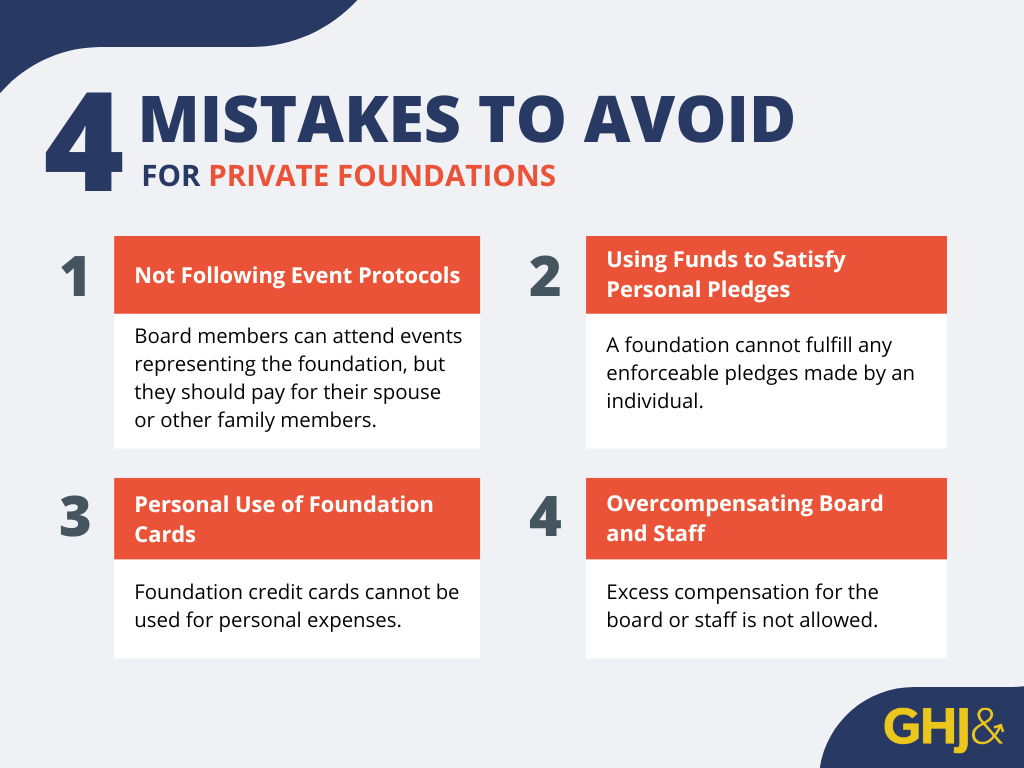| GHJ’s Risk Management for Private Foundations Series: Navigating Challenges and Seizing Opportunities dives deep into the risks that private foundations face and offers practical solutions across a spectrum of areas including automation, cybersecurity and new giving strategies. Gain insights into implementing new ideas, ensuring compliance and exploring innovative partnerships to enhance impact. Learn more. |

For many families, the goal of establishing a private foundation is to do good while bringing the family together. The founders are passionate about giving and want to create an impactful legacy for decades to come. However, having a private foundation comes with administrative requirements.
Private foundations can reduce the risk of compliance issues by hiring a professional administrator. A qualified professional administrator and philanthropic advisor stays on top of the ever-changing regulations and they can provide the foundation with best practices and help the foundation avoid common compliance pitfalls.
BENEFITS OF HIRING A PROFESSIONAL ADMINISTRATOR
For some foundations, it makes more sense to outsource the administrative duties. One of the primary advantages is that a professional administrator stays up to date on all compliance requirements.
"If you are not on top of those rules by attending conferences and reading regulations, it is easy to misstep," shares Pegine Grayson, Director of Philanthropic Services at the Whittier Trust.
Private foundation founders are often extremely passionate about philanthropy but are less thrilled about the mundane tasks involved in staying compliant with tax and other regulatory rules. By working with a professional administrator, private foundations can have the regulatory pain points taken care of and instead focus on the mission.
A professional administrator and philanthropic advisor cover a variety of essential administrative tasks, including preparing documents for the annual audit and tax return preparation, ensuring everything gets filed on time, coming up with the annual operating and giving budget, putting together material for board meetings, keeping the minutes and helping the foundation steer clear from self-dealing.
Another benefit is that an administrator can serve as a third-party that helps all family members feel included, including teens and young adults.
"A professional administrator helps facilitate conversations to help younger family members discover their own voices and get excited about participating in the foundation's activities," Pegine notes. ”It can be especially helpful to assign younger advisors to engage younger family members.”
It positively shifts the communication process.
"Teens may be busy individuating, and young adults can be distracted by new jobs and raising kids,” she adds. “Without an outside facilitator, the family foundation can be viewed as either another ‘should’ or 'Mom and Dad's thing.’ Professional facilitation can create a safe for exploring what meaningfully participating looks like to all generations."
COMMON COMPLIANCE PITFALLS TO AVOID
Self-dealing and conflict of interest are two sets of compliance rules that a private foundation needs to be aware of.
"Self-dealing is 100-percent prohibited," Pegine explains. "But conflicts of interest are to be expected; they’re OK as long as they are disclosed and decision-making is conducted by disinterested directors.”
As a best practice, Pegine says that foundations should have a conflict-of-interest policy and individuals on the board and on staff need to disclose their personal associations with relevant businesses and nonprofits. The professional administrator, who is familiar with the rules, can guide the foundation to work around them and stay in compliance.
For example, many foundation board members also serve on the boards of public charities, who are potential grantees of the foundation. This gives rise to a conflict of interest in the foundation’s grant-making decisions. During board meetings, when the potential grantee is discussed, it is not inappropriate for board members with a conflict of interest to contribute to the discussion, but they should abstain from voting.
Self-dealing is an entirely different matter. Self-dealing rules are tricky and counterintuitive at times, and the penalties for self-dealing can be considered draconian.
Pegine shares that sometimes foundations and board members unwittingly get themselves in trouble, and the common pitfalls they have seen are tickets and tables for galas, the fulfillment of personal pledges with foundation funds, unintentional misuse of foundation credit cards and receiving valuable perks in exchange for foundations grants.
"If a board member receives any financial benefit that is more than insignificant in the IRS’ eyes in exchange for their grant, that is self-dealing, and it is a violation," Pegine says.
Here are some common examples of prohibited acts of self-dealing that private foundations must completely avoid:
- A board member can attend an event representing the foundation, but they should pay for their spouse, date or other non-serving family members.
- The foundation cannot fulfill an enforceable pledge made by a disqualified person.
- Foundation credit cards cannot be used for personal expenses.
- Disqualified people cannot receive use of a football season suite at the university athletic stadium in exchange for a foundation grant.
- Excess compensation for the board or staff is not allowed.
Unfortunately, many people find themselves unwittingly committing a second act of self-dealing when they try to correct a previous one. If a potential problem is uncovered, Pegine recommends engaging a nonprofit attorney to advise on the best way to correct it.


